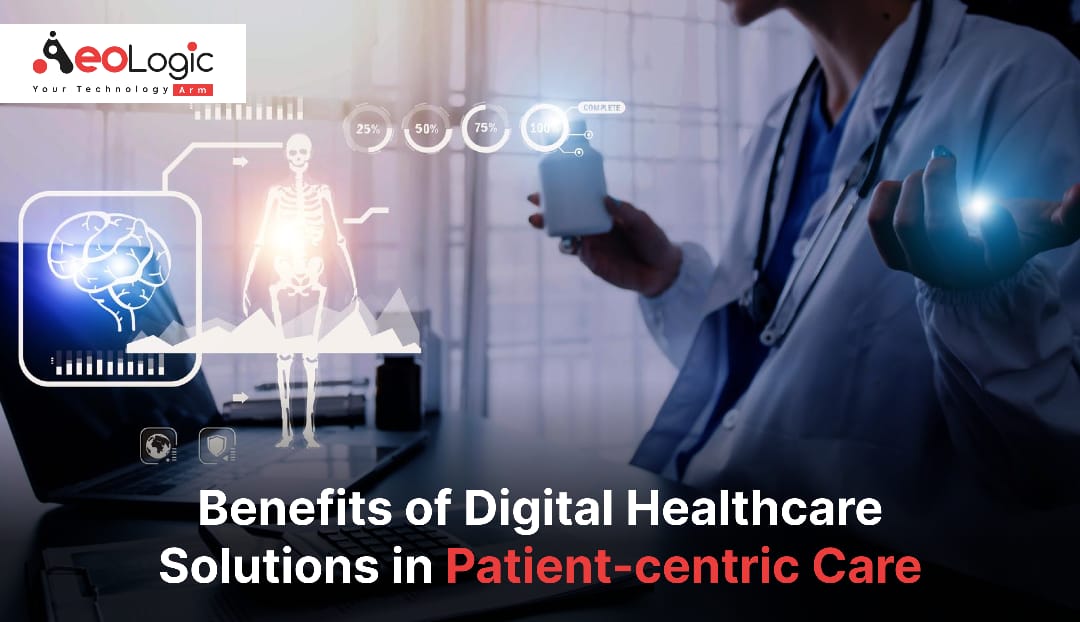Burdened by strict regulations, the healthcare sector lags before numerous other sectors in digital transformation. Still, with the rapid rise of technology, hospitals and healthcare systems have started sluggishly replacing traditional medical practices with digital healthcare solutions. Digital healthcare solutions are revolutionizing the approach to patient care and smart healthcare systems. They serve as a ground, connecting every hand of the healthcare experience, from original discussion to ongoing treatment operation, by exercising cutting edge technology. While it requires aligning and managing multiple stakeholders along the care journey, the patient is really at the center of health operation, care, and communication.
Also read: The Role of Big Data in Personalized Medicine
How Digital Healthcare Solutions Lead to Patient Centric Care
In this ultramodern age, patients and their families are largely empowered as digital consumers in everyday life. Patient centric care is certainly about furnishing digital healthcare solutions that are regardful of and responsive to individual patient preferences, requirements, and values. As patient demands continue to evolve, healthcare providers need to borrow digital strategies that will help them make strong patient- doctor connections and deliver excellent healthcare experiences.
Digital transformation and cutting edge technology play a vital part in offering substantiated care through a variety of channels and touchpoints. Digital results can ameliorate healthcare services by better connecting patients, doctors, and healthcare systems. Also, digital platforms enable patients to manage their own health by tracking vital signs and drug.
Patients highly encourage the use of digital tools to cover their health proactively. Wearable devices, mobile apps, and online patient doors allow individualities to track vital signs, symptoms, and drug adherence.
For patient, mobile healthcare apps and results that allow connections between patients and healthcare providers ameliorate service availability and give real time care. Digital healthcare solutions can store all past data related to patients’ conditions in a single depository, enabling healthcare providers to take immediate action.
Using Digital Health Data for Improved Issues
Digital healthcare solutions have opened the door to data driven drug. Healthcare providers can harness this wealth of data to gain precious perceptivity into patient populations, complaint trends, and treatment effectiveness. By assaying large datasets, healthcare associations can identify patterns and make data informed opinions to ameliorate care delivery. For patient, predictive analytics can be used to prevision complaint outbreaks in specific regions, allowing for visionary measures to be taken. Individualized treatment plans can be drafted grounded on a patient’s unique health data, optimizing issues.
A Patient’s Journey
Patients discover pharmaceutical companies and their curatives in different ways, using Google search, product booklet, and community support groups. When they begin using a product, a new path in their journey unfolds. From encountering adverse goods to passing positive issues, each patient’s journey is different, complex, and shaped by their individual health condition.
While there’s no secret to success or a one- size- fits- all remedy, the patient’s journey can be bettered and substantiated by bridging the gap between all stakeholders involved in the healthcare process. This is where digital technology comes into play, and its effectiveness, effectiveness, and ease of relinquishment can make or break a healthcare product.
The Role of Healthcare Providers and Human Touch in the Digital Age
Healthcare providers aren’t just medical experts; they’re also getting crucial players in the digital transformation journey. Their part is evolving to include the perpetration and operation of digital healthcare solutions. This requires a new set of chops, for example, as data analysis and digital knowledge, to effectively use these tools to enhance patient care.
Constant education and training are essential to insure that healthcare providers can acclimatize to the fleetly changing digital geography.
Despite the numerous benefits of digital health solutions, the significance of a human touch can not be exaggerated. Technology should enhance, not replace, the patient- provider relationship. Assuring that digital results are user friendly and sympathetic in design is pivotal to maintaining the trust and confidence of patients.
Enhancing Availability and Convenience
Digital health results have significantly bettered availability, making healthcare services more available to those in remote areas or with mobility challenges. With the rapid relinquishment of digital technologies around the world, digital tools for example, as telemedicine, mobile operations, virtual video consultations, examinations, or remote monitoring have come the new norm.
For patient, telehealth has been a game changer, allowing patients to admit care from the comfort of their own homes. This not only reduces the burden on healthcare installations but also saves time for both patients and providers. Patients are willing to borrow digital services if they match their requirements and insure high quality.
Numerous patients indeed prefer mobile healthcare apps to in person consultations.
Also read: Impact of RFID Solutions in the Pharmaceutical Industry
The Future of Digital Health is Cooperative
The future of digital healthcare isn’t solely about technology; it’s about collaboration. With the ongoing advancements in digital healthcare, we are on the cusp of a new period where the patient isn’t just a recipient of care but an active party in their health journey.
Multi disciplinary teams, including doctors, nursers, tech experts, and patients themselves, need to work together to design results that truly meet the requirements of patients. For example, collaboration can lead to innovative results that are both effective and extensively accepted.
The role of digital healthcare solutions in patient centric care is further than just a technological upgrade; it’s a complete shift in the healthcare paradigm. By embracing digital strategies, healthcare providers can offer more individualized, effective, and accessible care. Still, the true success of these enterprise depends on the capability to balance invention with empathy, assuring that the patient remains at the heart of the healthcare experience.







